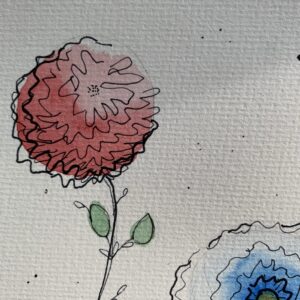Ever heard that (not very) dirty joke, “How is sex like ice cream?” “Because when it’s good it’s really good, and when it’s bad, it’s still pretty good?” Well, church, is not like ice cream. When church is bad, it’s very, very bad. When it’s average, it’s still pretty bad.
But when church is good, it’s really, really good. Good church meetings are life-altering, paradigm-shiftingly good. I hope you’ve had the chance to attend church on one of those days when it’s really, really good for you — when your mind opens and you see and feel both Reality/Pain and Hope/Delight, when you realize you are not alone in this journey, and the slog may actually be doable.
Today was one of those really, really good church days. They’ve been few and far-between for me of late, and I was left wondering what’s the difference? Why did this particular set of talks resonate with me more than the more polished, general conference-esque talks we get most weeks?
The talks were Real.
And I don’t mean that what was said during the super dull, cookie cutter talks last week wasn’t real, but the talks just weren’t Real. Last week, the talks were like every other talk you’ve ever heard at church. Two delightful move-ins shared a series of connected summaries of the general conference talks they were assigned, with a brief mention at the end of the very difficult struggle they were having in their family but they have faith and the church is true amen. Looking squarely at challenges just isn’t done. We come at them at angle and quickly slide off with a testimony statement. On to better things. It’s not so bad.
I think there’s a part of us that thinks if we admit we are struggling, we admit we don’t have enough faith (and God may not answer us if we doubt/or prophets may not be real if the formula doesn’t work). God will bless us if we just believe. All will be made right in the celestial kingdom. God needed him more than you did. Your children will return if you are obedient. This is the danger of too well-trained, too well-correlated church: too many pat answers.
But Real life seldom seldom works with pat.
I think a couple of things that made today’s talks (layperson’s sermons, in Mormon-speak) different than the usual, were that they came from sources that knew and faced real pain. When the speaker described his escape from his African country of origin and asked where was his Moses when he suffered, I related viscerally. You would have, too. Every one of us has looked at the stories in the Bible and wondered where is my Moses when prayers went unanswered or no one came to save you. When the speaker said he was still waiting on the Lord to answer his many, yet unanswered, prayers, I knew what he meant. You do, too. I related because the struggles he acknowledged were Real — Real life looked at squarely. It was a here’s how I do life even though I have not had a miracle, not a here’s how the prophets say you should do it, or here’s the pattern of idealized suffering that leads inevitably and quickly to miraculous relief. I need more Real examples of gospel living. More real, less Utah-perfect.
The longer I’m alive, the more I realize that everything I need to know about life I really did learn from Star Trek, just like my old poster said. When offered freedom from pain by Spock’s errant brother Sybock in Star Trek V, Captain Kirk passionately retorts, “I need my pain!” Pretending away suffering just doesn’t do it for me. I need to look squarely at the things that hurt, feel them, determine the cause, and shift positions. It’s the discomfort that motivates me to take action. I need my pain, because it makes me move. My pain causes me to want to make myself and the world better. Pain — felt and felt deeply — is the impetus for building the kingdom, right here, right now. I don’t need hypothetical nirvana or hypothetical exaltation; I need Real relief, right now.
I have always loved the scripture in 2 Nephi 2:25: “Adam fell that men might be; men are that they might have joy.” It’s a comforting notion — that the purpose of man’s creation is for us to have joy. But I’m interested in how few of us connect it with the sentiment earlier in verse 11: “For it must needs be that there is an opposition in all things. If not so, my firstborn in the wilderness, righteousness could not be brought to pass, neither wickedness, neither holiness nor misery, neither good nor bad… no life neither death, nor corruption nor incorruption, happiness nor misery, neither sense nor insensibility.” This latter verse underscores something: we can’t have good if there’s not bad. We can’t recognize good without it’s opposite.
Years ago Jared and I planned a cruise of the Mediterranean. It departed out of Barcelona, but weather delays in DC meant we missed our connecting flight in Ireland, and we ultimately changed our flight to try at catch the ship at its first port, Marseille. Due to windy weather on the Mediterranean, the cruise ship did not dock In Marseille and we, along with several others, missed our chance to leave with the ship. The cruise company paid for all of us to take an 8 hour taxi drive to the next port in Florence. I’ve never seen anything so beautiful. We traveled right along the coastline through Nice and Genoa. The stepped white homes alternating with the beautiful French countryside were incredible. For the first few hours, the beauty overwhelmed us. But after a few hours, we stopped remarking on or even noticing the beauty of the area. It was all stunning, and without any ugly bits, we actually forgot to how to see the beauty around us. I’ve never forgotten it. The Book of Mormon is right: I need opposites, or opposition, to be able to recognize good and bad. I need ugly to see beauty.
If this is so, how can we have joy without agony? If humans are created to have joy, we are also created to have agony. We may well say that Adam fell that men might be; men are that they might have pain.
How seldom do we address the Reality of pain squarely in our meetings? We are Mormon Buddhists, pretending that somehow if we follow the right practices our sufferings will cease. If we meditate and detach ourselves from others and the world, we can avoid all suffering. If we pray and follow the prophet, we can avoid all suffering. It’s all about avoiding suffering, but our theology and our experience tell us suffering can not be avoided.
Suffering is Real.
What marks the difference between a Utah talk and a Real talk is acknowledging that pain/suffering is a reality in our lives — that joy is not the only emotion the faithful experience and can acknowledge. It’s not just Mormon fundamentalists who are trying to “Keep Sweet”. The mainstream LDS do it, too. Too many of our talks exhibit a fundamentalist attitude that acknowledging pain is akin to saying that living the gospel doesn’t work. Obedience doesn’t always bring blessings, and prayers are not always answered. We slog on anyway, and I think describing how we muster the courage to keep going is what makes sacrament talks Real — certainly these talks are the ones I enjoy most: the ones that are more lived Mormonism than doctrine.
To bring this full circle, I suppose I must admit that in order for church to be life-altering sometimes, it must be not-life-altering others. Opposition in all things. So church isn’t like ice cream, and I’ve got to stop expecting it to be.



